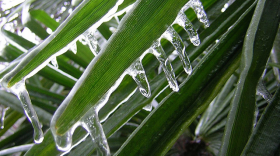Florida Gulf Coast University's sociology club held its 7th Annual Social Science Symposium on Thursday. Along with a number of faculty presenters throughout the day, twelve student research projects were featured at the event, ranging in subject from "Group Influence on College Students' Political Attitudes" to "The ESOL Program and the Students Within It."
Here are some of those studies.
…
Kaitlin Anzualda and Leslie Urgelles: The Effects of Race on Sentencings
Anzualda: We’re currently taking a class called Global Sociology. It’s taught by Dr. Meij. It’s surrounded and pretty much revolved around white nationalism and the current racial tensions that are going on in America today. And, so, we had to do a research project, and me and Leslie are both forensic studies majors, so we wanted to interconnect our major with the research project.
Urgelles: For certain crimes, you can definitely see a big discrepancy, while with others, they’re kind of mixed results. Like, you might have one Caucasian who gets, like, the most severe kind of punishment, and then, you might also have a minority who got a less severe punishment. So, at the moment, our results are pretty mixed, but we’re still currently analyzing some other data as well.
One of the problems we run into with this project, the database that we use considered Hispanic as its own race. Right, so it was white, black, Hispanic, and other and pacific islander and stuff like that, for example. But, when you think about it, Hispanics can be considered white because you can also have black Hispanics. Hispanics can be a wide range of things, so we’re like, “That’s very interesting,” but that’s a not a problem, you know, we can control unfortunately. That’s something that’s, like, I guess, societal in a way. So, we just tried to go with it.
…
Caroline Rowe and Sarah Lee: On Sexual Assault and News Outlets
Rowe: We decided to do the public response to sexual assault allegations, specifically within politicians. We chose Donald Trump, Roy Moore and Al Franken because we wanted to choose three of the biggest cases basically to get the most range of comments. We chose two Republicans and one Democrat also to get, like, a variation within the politicians. So far, what we found is within the Republican candidates, Republicans are more likely to defend them, and then, as you progressively get more liberal, they’re saying that they should, like, step down or should not be allowed to have their positions. But, then, within the liberal candidate, which was Al Franken, pretty much everyone was in agreement that he should step down, no matter where they landed, which I found interesting because a lot of Republicans are saying, “Yes, of course, he should step down,” but then, when it was their own candidate, they weren’t saying that. But, then, the liberals kind of held more of a consistent opinion throughout, no matter who the candidate was.
…
Carlos Reyes & Griffin Oppenheimer: Confederate Monuments and Social Tensions in the United States
Oppenheimer: So, a lot of this was brought after Dylann Roof went into a church and murdered nine African Americans. So, that’s sort of what brought up the conversation, and we’re saying, “The conversation’s brought up, but how can we find objective evidence that this is why these were created?” So, we’re not really looking at the effect that they have now, and that’s a lot of what people are looking at — like, the effect they have now, how they make people feel. We’re not doing that. We’re… we’re trying to figure out, like, when it was made, and is that a correlation to racist intent.
Reyes: We’re taking the erection of confederate monuments, the naming of school buildings and official government buildings that correlate to the confederacy into count when making a correlation graph about violence against African Americans and social tensions in general.
Oppenheimer: We found that, like, in this very, very large peak of when courthouses and monuments were made, that was when the NAACP was formed, and then, right in the area where most schools were named after the confederacy, that was during Brown v. Board and the Little Rock Nine. So, you can’t say that it’s causation, but you can easily see a correlation in that.








